五年级英语同步辅导讲义
- 格式:pdf
- 大小:24.67 KB
- 文档页数:8
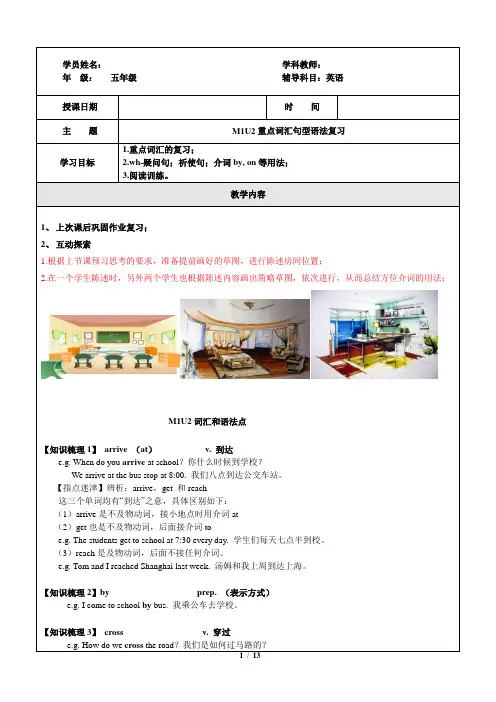
1、上次课后巩固作业复习;2、互动探索1.根据上节课预习思考的要求,准备提前画好的草图,进行陈述房间位置;2.在一个学生陈述时,另外两个学生也根据陈述内容画出简略草图,依次进行,从而总结方位介词的用法;M1U2词汇和语法点【知识梳理1】arrive (at)v. 到达e.g. When do you arrive at school?你什么时候到学校?We arrive at the bus stop at 8:00. 我们八点到达公交车站。
【指点迷津】辨析:arrive,get 和reach这三个单词均有“到达”之意,具体区别如下:(1)arrive是不及物动词,接小地点时用介词at(2)get也是不及物动词,后面接介词toe.g. The students get to school at 7:30 every day. 学生们每天七点半到校。
(3)reach是及物动词,后面不接任何介词。
e.g. Tom and I reached Shanghai last week. 汤姆和我上周到达上海。
【知识梳理2】by prep. (表示方式)e.g. I come to school by bus. 我乘公车去学校。
【知识梳理3】cross v. 穿过e.g. How do we cross the road?我们是如何过马路的?【知识拓展】cross作动词,意为“横穿”,如:横穿马路cross the road,横穿大桥cross the bridgee.g. Be careful when we cross the street. 当我们过马路时要小心。
【知识梳理4】get off 从···下来e.g. He gets off the train at Park Street. 他在公园街站下了火车。
We will get off the bus at the next stop. 我们将在下一站下车。
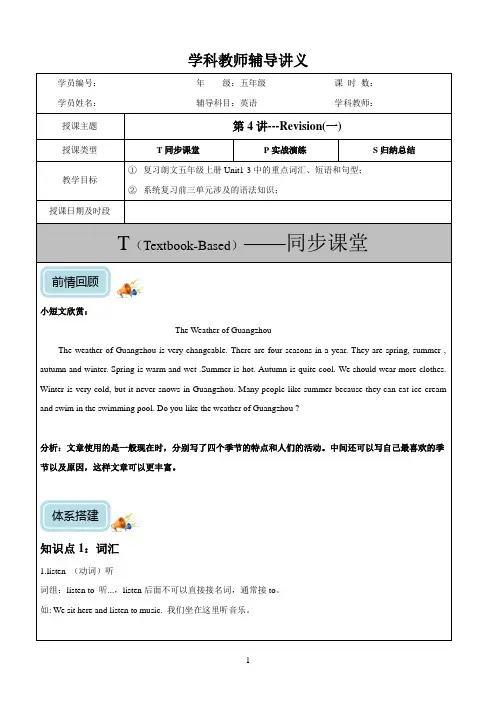
学科教师辅导讲义学员编号:年级:五年级课时数:学员姓名:辅导科目:英语学科教师:授课主题第4讲---Revision(一)授课类型T同步课堂P实战演练S归纳总结①复习朗文五年级上册Unit1-3中的重点词汇、短语和句型;教学目标②系统复习前三单元涉及的语法知识;授课日期及时段T(Textbook-Based)——同步课堂前情回顾小短文欣赏:The Weather of GuangzhouThe weather of Guangzhou is very changeable. There are four seasons in a year. They are spring, summer , autumn and winter. Spring is warm and wet .Summer is hot. Autumn is quite cool. We should wear more clothes. Winter is very cold, but it never snows in Guangzhou. Many people like summer because they can eat ice-cream and swim in the swimming pool. Do you like the weather of Guangzhou ?分析:文章使用的是一般现在时,分别写了四个季节的特点和人们的活动。
中间还可以写自己最喜欢的季节以及原因,这样文章可以更丰富。
体系搭建知识点1:词汇1.listen (动词)听词组:listen to 听...,listen后面不可以直接接名词,通常接to。
如: We sit here and listen to music. 我们坐在这里听音乐。
典例分析例题1:填空单词。
1. I want to go f______ this Sunday.2. Kate is good at playing c______.3. Tom is going to have a p______ with his parents this afternoon.4. I don’t like watching TV, it is b______.5. This room is m_______. All clothes are on the floor.6.She wants to drink want, but the cup is e______.7.H____ on! I will get him.8.The box is too h______. I can’t carry it.9.There are many k______ of animals on earth.10.I visited my uncle the day before y________.例题2:翻译.1.surf the Internet _____________________2. hold on _____________________3. in spare time _____________________4. fall down _____________________e over _____________________6. 擅长_____________________7. 听音乐_____________________ 8. 与...谈话_____________________9. ……怎么样呢?_____________________ 10.当心_____________________答案:1.fishing 2.chess 3.picnic 4.boring 5.messy 6.empty 7.Hold 8.heavy 9.kinds10.yesterday1.网上冲浪2.不挂断电话3.在空闲的时间4.落下5.过来6.be good at7.listen to music8.talk to 9.what about 10.take careP(Practice-Oriented)——实战演练专题精讲复习一般过去时和一般将来时:一、一般过去时1.概念:表示在的过去某个时间里所发生的动作或存在的状态。
![[小学]五年级英语下册同步辅导教学大纲](https://uimg.taocdn.com/e08f28a50242a8956bece4fb.webp)
[小学]五年级英语下册同步辅导教学大纲五年级英语下册同步辅导教学大纲Unit1: This Is My Day1. 重点词汇:do morning exercises eat breakfast have English class play sportseat dinner when evening get up at usually noon climb mountains go shopping play the piano visit grandparents go hiking weekend often sometimes2. 重点句型:—When do you eat dinner?—I eat dinner at 7:00 in the morning.—When do you get up?—I usually get up at 12:00 noon.—What do you do on the weekend?—Usually I watch TV and go shopping. Sometimes I visit my parents. / I oftenplay football. Sometimes I go hiking. 3. 发音:ai wait rain paint trainay say play today Maygr great green grow grassgl glad glue glass gloveUnit2: My Favourite Season1. 重点词汇: spring summer fall winter season which best swim flykites skate make a snowman plant trees why because sleep2. 重点句型:—Which season do you like best?—I like winter best.—Summer is good, but fall is my favourite season.—Why do you like summer?—Because I can swim in the lake.—Why do you like winter?—Because I can sleep a long time.3. 次重点句型:When is the best time to go to Beijing?What can I do there?—When is the best time to go to Beijing?—It’s sunny and cool.4. 发音:air air hair chair stairear bear wear swear pearsp speak speed spell splashsk ski skate sky skirtUnit3: My Birthday1. 重点词汇:Jan.---January Feb. ---February Mar. ---March Apr. ---AprilMay June July Aug. ---August. Sept. ---September Oct.---October Nov. ---November Dec. ---December birthdayuncle her date2. 重点句型:—When is your birthday?—It’s in May—My birthday is in June. Uncle Bill’s birthday is in June, too.—Is her birthday in June?—Yes.—What’s the date?th—June 93. 发音:ear ear hear dear neareer deer cheer beerch cheap chair chip checksh shoulder sheep ship shopRecycle 1:一( 复习:1.复习重点词汇(每个单元选出部分)2(复习重点句型(重点句型采取对话练习、角色扮演复习方式)1:do morning exercises eat breakfast have English class play sports eatdinner go shopping often sometimes usually;spring summer fallwinter season which best swim fly kites make a snowman planttrees why because;Jan.---January Feb. ---February Mar. ---March Apr. ---April May June July Aug. ---August. Sept.---September Oct. ---October Nov. ---November Dec. ---Decemberbirthday date2:见教学大纲 Unit 1. Unit 2. Unit 3. 重点句型.二( 巩固: 学生独立完成 Recycle1 的练习题---Ask and answer. Read and answer. Listen and number. Write and say. Listen and write. Let’s chant. Let’s find out.每个练习完成后,教师讲解答案.Unit 4: What Are You Doing?1. 重点词汇:draw pictures cook dinner read a book answer the phonelisten to music clean the room write a letter write an e-mailmom grandpa study2. 重点句型:This is Zhang Peng.—What are you doing?—I’m doing the dishes. / I’m reading a book.Grandpa is writing a letter. Brother is doing homework. Mom is cookingdinner in the kitchen.He is writing an e-mail in the study. 3. 发音:oo cool boots goose schoolou soup group couptr train tree try trektw twelve twist twenty twinUnit5: Look at the Monkeys1. 重点词汇:fly jump walk run swim kangaroo sleep climb fightswing drink water2. 重点句型:—What is it doing?—It’s eating bananas.She is jumping.—What are they doing?—They’re swimming. / They are climbing trees. 3. 次重点句型: —What do you see?—I see two elephants.—Can you see the monkeys?—Yes. They are swinging.4. 发音:a class glass pass vasear park star car hardsm smoke smile small smellsl slow sleep slippers slipUnit6: A Field Trip1. 重点词汇:take pictures watch insects pick up leaves do an experimentcatch butterflies honey count insects collect leaves write a report play chess have a picnic2. 重点句型:—Are you eating lunch?—No, we aren’t.—Are they eating the honey?—Yes, they are.—Is he playing chess?—Yes, he is.—Is she counting insects?—No, she isn’t.—Where is Zhang Peng?—He’s in the woods.3. 发音:y cry try fly spyigh high flight light nightqu queen quite quiet quitRecycle2:一、复习:1.复习重点词汇(Unit4. Unit5. Unit6 选出部分)2.重点句型(重点句型采取对话练习、角色扮演复习方式):draw pictures cook dinner read a book answer the phone listen 1 to music clean the room write a letter fly jump walk runswim kangaroo sleep climb fight take pictures watch insects pick up leaves do an experiment catch butterflies write a report play chesshave a picnic2:见教学大纲Unit 4.Unit 5.Unit 6重点句型.二、巩固:学生独立完成Recycle2的练习题---Read and match Let’s find outLet’s chant Read and draw Write and retell Read and write Number and write Let’s play每个练习完成后,教师讲解答案.。
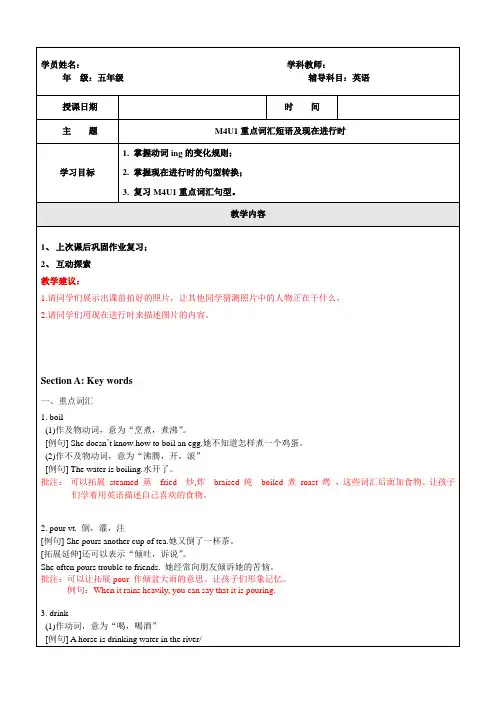
学员姓名:学科教师:年级:五年级辅导科目:英语授课日期时间主题M4U1重点词汇短语及现在进行时学习目标1. 掌握动词ing的变化规则;2. 掌握现在进行时的句型转换;3. 复习M4U1重点词汇句型。
教学内容1、上次课后巩固作业复习;2、互动探索教学建议:1.请同学们展示出课前拍好的照片,让其他同学猜测照片中的人物正在干什么,2.请同学们用现在进行时来描述图片的内容。
Section A: Key words一、重点词汇1. boil(1)作及物动词,意为“烹煮,煮沸”。
[例句] She doesn’t know how to boil an egg.她不知道怎样煮一个鸡蛋。
(2)作不及物动词,意为“沸腾,开,滚”[例句] The water is boiling.水开了。
批注:可以拓展steamed 蒸fried 炒,炸braised 炖boiled 煮roast 烤,这些词汇后面加食物。
让孩子们学着用英语描述自己喜欢的食物。
2. pour vt. 倒,灌,注[例句] She pours another cup of tea.她又倒了一杯茶。
[拓展延伸]还可以表示“倾吐,诉说”。
She often pours trouble to friends. 她经常向朋友倾诉她的苦恼。
批注:可以让拓展pour 作倾盆大雨的意思。
让孩子们形象记忆。
例句:When it rains heavily, you can say that it is pouring.3. drink(1)作动词,意为“喝,喝酒”[例句] A horse is drinking water in the river/You shouldn’t drink and drive.(2)作名词,意为“饮料”。
[例句] They sell soft drink only.Drinking too much soft drink is bad for your health.批注:注意跟学生强调drink 作名词时不可数。
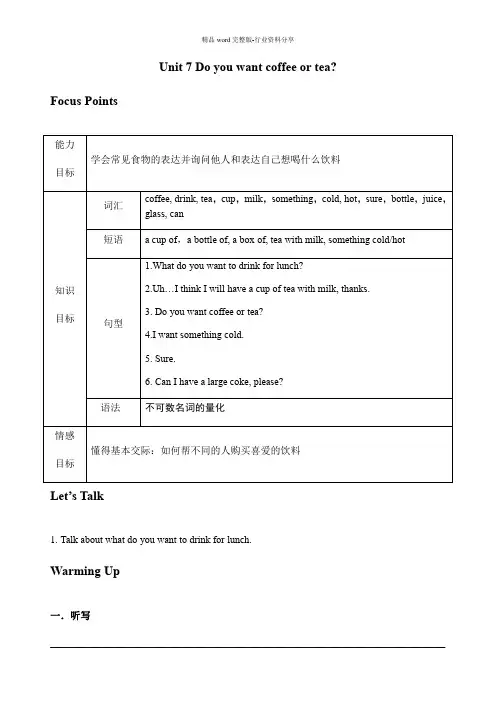
Unit 7 Do you want coffee or tea?Focus PointsLet’s Talk1.Talk about what do you want to drink for lunch.Warming Up一.听写______________________________________________________________________________________________________________________________________________________________ _______________________________________________________________________________ _______________________________________________________________________________ ___________________________________________________________________________________________ ___二.单词及短语1.咖啡____________________________2. 茶___________________________3.喝;饮料________________________4. 冰淇淋_______________________5.牛奶____________________________6. 可乐_________________________7.果汁____________________________ 8. 杯___________________________9.瓶子____________________________ 10.玻璃杯_______________________ 11.罐______________________________ 12.热的_________________________ 13.冷的____________________________ 14.某事;某物___________________ 15.某事;某物______________________ 16.奶茶_________________________ 17.一瓶果汁________________________ 18.一杯水_______________________ 19.一盒牛奶________________________ 20.一杯茶_______________________ 21.一罐可乐________________________ 22.一些冷的东西_________________ 三.课文内容根据提示把句子补充完整。
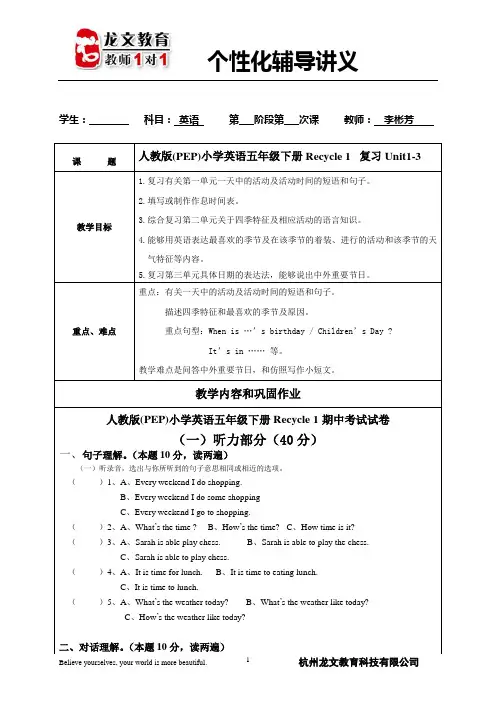
学生:科目:英语第阶段第次课教师:李彬芳课题人教版(PEP)小学英语五年级下册Recycle 1 复习Unit1-3教学目标1.复习有关第一单元一天中的活动及活动时间的短语和句子。
2.填写或制作作息时间表。
3.综合复习第二单元关于四季特征及相应活动的语言知识。
4.能够用英语表达最喜欢的季节及在该季节的着装、进行的活动和该季节的天气特征等内容。
5.复习第三单元具体日期的表达法,能够说出中外重要节日。
重点、难点重点:有关一天中的活动及活动时间的短语和句子。
描述四季特征和最喜欢的季节及原因。
重点句型:When is …’s birthday / Children’s Day ?It’s in ……等。
教学难点是问答中外重要节日,和仿照写作小短文。
教学内容和巩固作业人教版(PEP)小学英语五年级下册Recycle 1期中考试试卷(一)听力部分(40分)一、句子理解。
(本题10分,读两遍)(一)听录音,选出与你所听到的句子意思相同或相近的选项。
()1、A、Every weekend I do shopping.B、Every weekend I do some shoppingC、Every weekend I go to shopping.()2、A、What’s the time ? B、How’s the time? C、How time is it?()3、A、Sarah is able play chess. B、Sarah is able to play the chess.C、Sarah is able to play chess.()4、A、It is time for lunch. B、It is time to eating lunch.C、It is time to lunch.()5、A、What’s the weather today? B、What’s the weather like today?C、How’s the weather like today?二、对话理解。
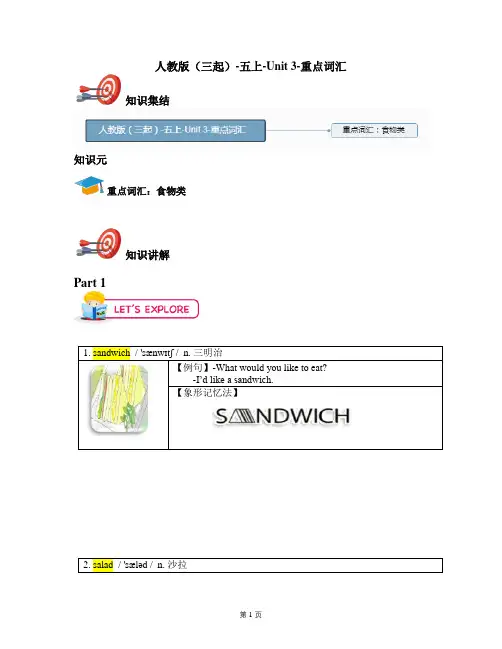
人教版(三起)-五上-Unit 3-重点词汇知识集结知识元重点词汇:食物类知识讲解Part 11. sandwich / 'sænwɪtʃ / n. 三明治【例句】-What would you like to eat?-I’d like a sandwich.【象形记忆法】2. salad / 'sæləd / n. 沙拉【例句】The fruit salad tastes sweet.【象形记忆法】3. hamburger / ˈhæmbɜ:gə / n. 汉堡【例句】My favorite food is beef hamburger.【象形记忆法】4. ice cream / aɪs kriːm / n. 冰激淋【例句】Children like eating ice cream in summer.【图片记忆法】5. tea / ti: / n. 茶【例句】I’d like a cup of tea.【象形记忆法】6. onion / 'ʌnjən / n. 洋葱【例句】Onion is a kind of vegetables.【象形记忆法】7. food / fuːd / n. 食物【例句】Chicken is my favorite food.【象形记忆法】8. drink / drɪŋk / v. 喝【例句】-What would you like to drink?-I’d like a cup of coffee.【象形记忆法】9. juice / dʒuːs / n. 果汁【例句】When you are thirsty, you can drink a glass of juice.【象形记忆法】10. yogurt / jɒgət / n. 酸奶酪【例句】Yogurt is good for your health.【象形记忆法】11. water / 'wɔːtə / n. 水【例句】We must save water.【象形记忆法】12. coffee / 'kɒfɪ / n. 咖啡【例句】 Coffee tastes bitter(苦的)if you don’t add sugar.【象形记忆法】13. vegetable / ˈvedʒtəbl / n. 蔬菜【例句】Vegetables are healthy food.【象形记忆法】14. beef / biːf / n. 牛肉【例句】We have beef for lunch today.【象形记忆法】15. noodle / 'nuːd(ə)l / n. 面条【例句】Noodles are very popular in China.【象形记忆法】Part 21. fresh / freʃ/ adj. 新鲜的【例句】The tofu is very fresh.【象形记忆法】2. healthy / 'helθɪ/ adj. 健康的【例句】Fish is delicious and healthy.【象形记忆法】3. delicious / dɪ'lɪʃəs/ adj. 美味的【例句】Is mushroom(蘑菇) delicious?【象形记忆法】4. hot / hɒt/ adj. 热的,辣的【例句】The red pepper(红辣椒) is very hot.5. sweet / swiːt/ adj. 甜的【例句】Candies are very sweet.【象形记忆法】6. thirsty / 'θɜːstɪ/ adj. 口渴的【例句】The boy feels very thirsty after running.【象形记忆法】7. favorite / 'feɪvərɪt/ adj. 最喜爱的【例句】John’s favorite sport is playing basketb all.【象形记忆法】8. bread / bred/ n. 面包【例句】My English teacher has bread for breakfast.9. milk / mɪlk/ n. 牛奶【例句】John likes drinking milk in the morning.【象形记忆法】例题精讲重点词汇:食物类例1.•Choose the right letters.1. n_ _dle A. oo B. oe C. eo2. d_ _ _k A. irn B. rin C. inr3. s_ _ad A. la B. al C. ol4. _ _ ion A. on B. un C. no5. f_ _d A. on B. in C. oo6. _ _ef A. eb B. ba C. be7. vege_ _ _le A. taa B. tab C. tba8. y_ _urt A. og B. go C. ge9. i_ _ A. ec B. ce C. cc10. c_ _am A. er B. re C. rr11. co_ _ _ _ A. ffea B. ffoe C. ffee12. ham_ _ _ger A. ber B. bur C. bru13. t_ _ A. ee B. ea C. ae14. jui_ _ A. ce B. ec C. ci15. wa_ _ _ A. ter B. tar C. tur【答案】ABBACCBABBCBBAA例2.Write sentences according to the example.Eg: I like bananas. They are sweet.1.1. I like _____. They’re _____.2.2. I like _____. They’re _____.3.3. I like _____. They’re _____.4.4. I like _____. It’s_____.5.5. I like _____. It’s _____.【答案】hamburgers deliciousvegetables healthyoranges sourfish freshonion hot当堂练习单句填空练习plete the words.1. I like salad. It’s h_____.2. -What would you like to drink? -I’d like some t_____, please.3. I would like some noodles. They are d_____.4. I’d like a _____ (三明治).5. -Is it _____? -Yes, it is.(甜的)【答案】healthyteadelicioussandwichsweet练习2.Choose the right letters.1. _ _lk A. il B. mi C. in2. s_ _ et A. we B. wa C. wi3. h_ t A. o B. p C. d4. _ _licious A. di B. de C. do5. f_ _sh A. ra B. ri C. re6. b_ _ad A. ra B. rr C. re7. th_ _ _ty A. irs B. isr C. rsi8. hea_ _hy A. tl B. ti C. lt9. f_ _ourite A. av B. iv C. cv10. w_ _ ld A. ou B. io C. oo 【答案】BAABCCACAA。
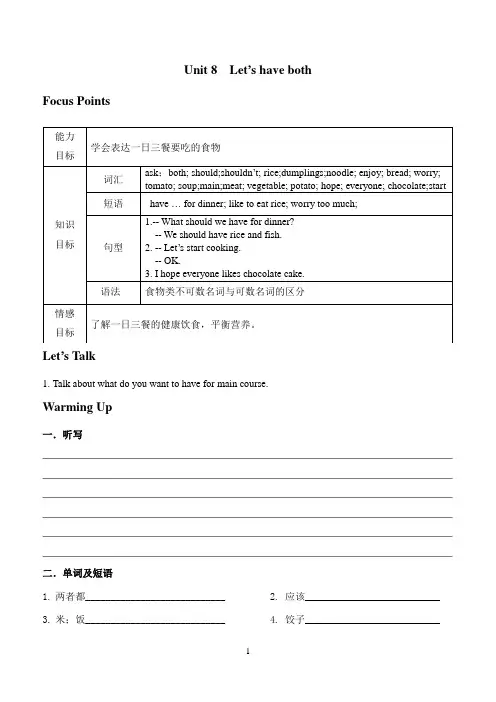
Unit 8 Let’s have bothFocus PointsLet’s Talk1.Talk about what do you want to have for main course.Warming Up一.听写__________________________________________________________________________________ __________________________________________________________________________________ __________________________________________________________________________________ __________________________________________________________________________________ __________________________________________________________________________________ __________________________________________________________________________________ 二.单词及短语1.两者都____________________________2. 应该___________________________3.米;饭____________________________4. 饺子___________________________5.面条______________________________6. 欣赏;喜欢_____________________7.面包______________________________8. 三文治_________________________9.炸薯条____________________________ 10.担心___________________________ 11.第一道菜__________________________ 12.西红柿_________________________ 13.鸡蛋______________________________ 14.汤_____________________________ 15.主要的____________________________ 16.每个人;所有人_________________ 17.开始______________________________ 18.巧克力_________________________ 19.希望______________________________ 20.马铃薯_________________________ 21.甜品______________________________ 22.蔬菜___________________________ 23.肉________________________________ 24.主菜____________________________ 25.西红柿蛋花汤______________________ 26.你多滤了_______________________ 27.参加她的派对______________________ 28.享受食物_______________________ 29.两者皆有__________________________ 30.头盘是_________________________ 31.主菜是____________________________ 32.甜点是_________________________ 33.肉煮蔬菜__________________________ 34.好主意_________________________ 35.巧克力蛋糕________________________ 36.开始做饭_______________________ 37.爱吃饭____________________________ 38.喝汤___________________________ 三.课文内容根据提示把句子补充完整。
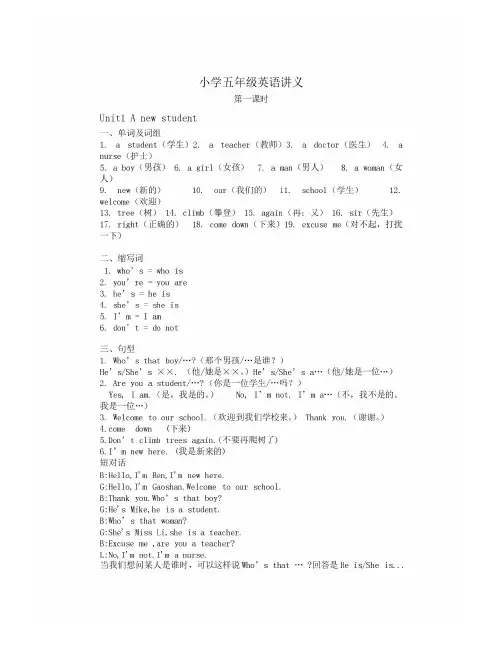
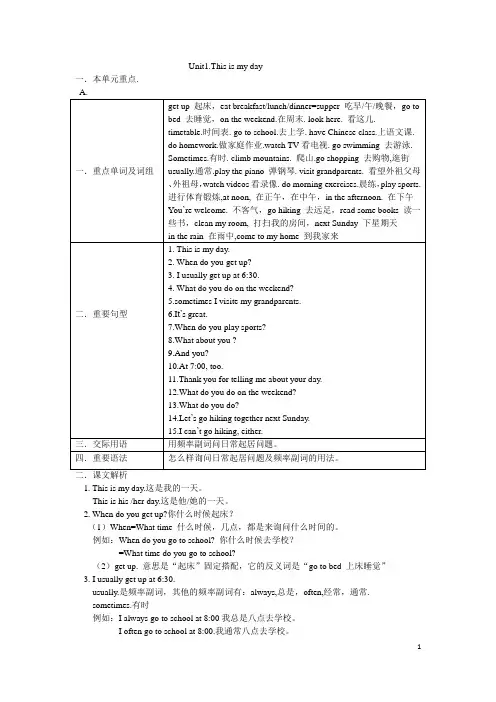
Unit1.This is my day一.本单元重点.二.课文解析1. This is my day.这是我的一天。
This is his /her day.这是他/她的一天。
2. When do you get up?你什么时候起床?(1)When=What time 什么时候,几点,都是来询问什么时间的。
例如:When do you go to school? 你什么时候去学校?=What time do you go to school?(2)get up. 意思是“起床”固定搭配,它的反义词是“go to bed 上床睡觉”3. I usually get up at 6:30.usually.是频率副词,其他的频率副词有:always,总是,often,经常,通常.sometimes.有时例如:I always go to school at 8:00我总是八点去学校。
I often go to school at 8:00.我通常八点去学校。
4. Oh, look here! This is my weekend timetable.哦,看这!这是我的周末时间表。
timetable 时间表。
它是由time和table 组合成了timetable.像这样的词叫做合成词。
time时间. table 这里是”表格”的意思。
表格里的时间称之为“时间表”另外:table还有桌子的意思。
那么它和desk有什么区别呢?table:通常指吃饭、娱乐、游戏等用的“餐桌、餐台、茶几”等,一般无抽屉用短语at table:“吃饭、进餐”,at a(the) table “在桌子旁”,而不一定是在吃饭。
例如:They are at table.他们在吃饭。
He studies at the table every day. 他每天坐在桌边学习。
desk多指学习、办公用的有抽屉的“课桌、书桌、写字台”等。
如: ten desks and chairs十套课桌椅。
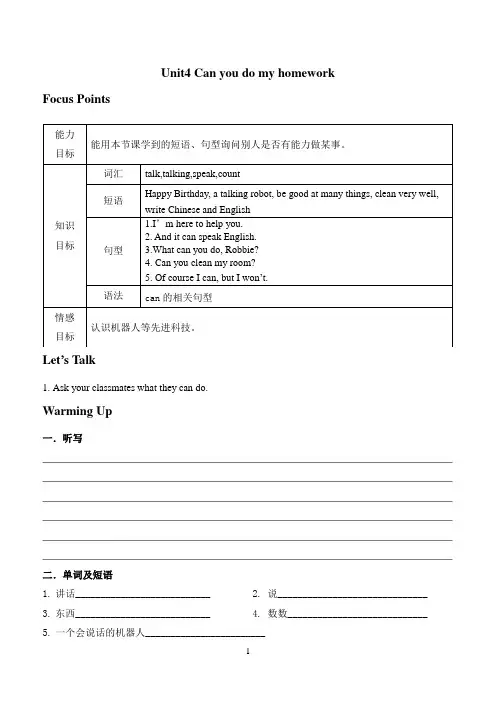
Unit4 Can you do my homeworkFocus PointsLet’s Talk1.Ask your classmates what they can do.Warming Up一.听写__________________________________________________________________________________ __________________________________________________________________________________ __________________________________________________________________________________ __________________________________________________________________________________ __________________________________________________________________________________ __________________________________________________________________________________ 二.单词及短语1.讲话___________________________2. 说______________________________3.东西___________________________4. 数数____________________________5.一个会说话的机器人________________________6. 擅长很多东西______________________________7.写汉字和英文______________________________8. 帮助孩子们学习____________________________9. 扫得很干净 _______________________________三.课文内容根据提示把句子补充完整。
授课日期时间主题M3U1重点词汇句型语法复习1、学习M3U1重点词汇及表达方式;学习目标2、掌握how的特殊疑问词,并能够熟练掌握英语中问路和指路的常见表达教学内容1. 上次课后巩固作业复习;2. 互动探索教学建议:1. 根据上节课的课后预习内容,讨论城市里的不同场所地点的英文称呼。
可以让每个学生到白板上去写出图片对应的单词,看谁写的又快又准确;2、让学生相互提问,如何到达各个场所,从而引导出本课的一则重要知识点——用英语进行问路的表达方式。
建议可以两个学生进行一问一答,第三个学生通过听前两名学生的对话,在图上画出相应的路线图。
然后交换进行。
1. Look and write. Write the names of places around our city in English.A._____________________B._____________________C.______________________D._____________________E.______________________F.______________________答案:A. hotel B. bank C. hospital D. bakery E. cinema F. museum2. Ask and answer. Suppose you are at the department store now, and you want to buy some books. But you don’t know where the bookstore is. What can you do then? Can you ask the way to the bookstore in English? Please make a dialogue with your partner. Write it down and then share it with us.参考:A:_________________________________ B:_________________________________ A:_________________________________ B:_________________________________ A:_________________________________ B:_________________________________A: Excuse me. How can I get to the bookstore?B: Walk along Garden Street. Turn right at the first crossing. Then go straight Adams Street and youwill see the bookstore next to the supermarket.A: Go along Garden Street and turn right, and then go straight. Right?B: Yes, that’s right.A: Great. Thank you very much.B: You are welcome.M3U1重点单词和短语教学建议:此部分内容为课本M3U1重点词汇,可以采用师生互动或者生生互动的方式,对于词汇和词组进行抢答。
学员编号:年级:课时数:学员姓名:辅导科目:英语学科教师:授课类型TM1U3(牛津5上)基础知识梳理教学目标1、使学生能够基本掌握牛津5年级上册Module1Unit3中的基础词汇及重要句型;2、使学生掌握M1U3学习的音标和自然拼读星级★★★授课日期及时段T同步-M1U3基础知识梳理(建议2-5分钟)The Death of the FlyMr. Smith: Waiter, there's a dead fly in my soup.Waiter: Yes, sir, I know---it's the heat that kills it.苍蝇之死史密斯先生:服务员,我的汤里有一只死苍蝇.服务员:是的,先生,我知道了,它是被烫死的.批注:上面的小故事是一个比较搞笑的脑筋急转弯,主要目的是通过小故事把学生带入本次课堂,且导出今天的课程---先不要给学生讲服务员最后说了什么,要求学生学完课本之后再给告诉学生服务员听到顾客的话之后说了什么!把悬念留到最后…(建议20-25分钟)想知道这个服务生面对顾客的抱怨说了什么吗?要解开谜底就要先闯关哦!单词关,我来了!一、词汇Words1. (be )afraid of 害怕,担忧e.g. But he is afraid of flying. 但是他恐惧飞行。
She is afraid of snakes. 她怕蛇。
He is afraid of going out alone at night. 他害怕夜里一人出门。
【知识拓展】be afraid 表示“害怕的,担忧的”批注:afraid是一个形容词,表示“害怕的,担忧的”。
如果只是表达我很害怕或担忧,而并未明确对象时,只需说I’m afraid. 不需要加of,可通过例句引导学生。
2. dream n. 梦想,梦e.g. What' s your job now and what's your dream job ?你现在的工作是什么,你梦想的工作是什么?3. farmer n . 农民e.g. Lucy’s father is a farmer. 露西的爸爸是一个农民。
Unit 4 What can you do? (A)Focus PointsLet’s TalkTalk about “What can you do?”Warming Up一.听写二.单词及短语1.唱英文歌曲_________________2. 练武术___________________3.画漫画_____________________4. 跳舞______________________5.弹琵琶_____________________6. 画画______________________ 三.课文内容根据提示把句子补充完整。
A: We’ll ______ ______ _______ _______(有个英语聚会)next Tuesday! ______ ______ ______ _____(你们会做什么)for the party, children?B: I _____sing English songs.A: Wonderful! ______ ______ ______,John?(你呢?)B: I can do some kung fu!A: Thank you.Language Points【知识考点一】---What can you do for the party, children? 你们能为聚会做什么,孩子们?---I can sing English songs.我会唱英文歌。
询问对方能够做什么的句型。
问句: What can you do?答句:I / We can + 动词原形(+其他)e.g ---What can you do?---I can play football.【试试看】(1) (2)1. ---What can you do? ---_________________________________________2. ---What can you do? ----_________________________________________Fun with Culture中国特色的文娱活动很多,比如京剧(Beijing opera)或昆戏等戏剧(drama),每逢节日或庆祝时的舞狮子、舞龙、猜灯谜和对山歌等活动,有趣的变脸和功夫(kungfu)表演,展览书法(handwriting)或国画(traditional Chinese paiting)作品,还有围棋、五子棋、歇后语、对对联等。
五年级英语下册同步辅导教学大纲Unit1: This Is My Day1. 重点词汇:do morning exercises eat breakfast have English class play sportseat dinner when evening get up at usually noon climb mountains go shopping play the piano visit grandparents go hiking weekend often sometimes2. 重点句型:—When do you eat dinner?—I eat dinner at 7:00 in the morning.—When do you get up?—I usually get up at 12:00 noon.—What do you do on the weekend?—Usually I watch TV and go shopping. Sometimes I visit my parents. / I oftenplay football. Sometimes I go hiking.3. 发音:ai wait rain paint trainay say play today Maygr great green grow grassgl glad glue glass gloveUnit2: My Favourite Season1. 重点词汇:spring summer fall winter season which best swim fly kites skate make a snowman plant trees why because sleep2. 重点句型:—Which season do you like best?—I like winter best.—Summer is good, but fall is my favourite season.—Why do you like summer?—Because I can swim in the lake.—Why do you like winter?—Because I can sleep a long time.3. 次重点句型:When is the best time to go to Beijing?What can I do there?—When is the best time to go to Beijing?—It’s sunny and cool.4. 发音:air air hair chair stairear bear wear swear pearsp speak speed spell splashsk ski skate sky skirtUnit3: My Birthday4.重点词汇:Jan.---January Feb. ---February Mar. ---March Apr. ---AprilMay June July Aug. ---August. Sept. ---September Oct.---October Nov. ---November Dec. ---December birthdayuncle her date5.重点句型:—When is your birthday?—It’s in May—My birthday is in June. Uncle Bill ’s birthday is in June, too.—Is her birthday in June?—Yes.—What’s the date?th—June 96.发音:ear ear hear dear neareer deer cheer beerch cheap chair chip checksh shoulder sheep ship shopRecycle 1:一.复习:1.复习重点词汇(每个单元选出部分)2.复习重点句型(重点句型采取对话练习、角色扮演复习方式)1:do morning exercises eat breakfast have English class play sports eatdinner go shopping often sometimes usually;spring summer fallwinter season which best swim fly kites make a snowman planttrees why because;Jan.---January Feb. ---February Mar. ---MarchApr. ---April May June July Aug. ---August. Sept.---September Oct. ---October Nov. ---November Dec. ---Decemberbirthday date2:见教学大纲Unit 1. Unit 2. Unit 3. 重点句型.二.巩固:学生独立完成Recycle1 的练习题---Ask and answer. Read and answer. Listen and number. Write and say. Listen and write. Let’schant. Let’s find out.每个练习完成后,教师讲解答案.Unit 4: What Are You Doing?5.重点词汇:draw pictures cook dinner read a book answer the phonelisten to music clean the room write a letter write an e-mailmom grandpa study6.重点句型:This is Zhang Peng.—What are you doing?—I’m doing the dishes. / ’I m reading a book.Grandpa is writing a letter. Brother is doing homework. Mom is cookingdinner in the kitchen.He is writing an e-mail in the study.7.发音:oo cool boots goose schoolou soup group couptr train tree try trektw twelve twist twenty twinUnit5: Look at the Monkeys7.重点词汇:fly jump walk run swim kangaroo sleep climb fightswing drink water8.重点句型:—What is it doing?—It’s eating bananas.She is jumping.—What are they doing?—They’re swimming. / They are climbing trees.9.次重点句型:—What do you see?—I see two elephants.—Can you see the monkeys?—Yes. They are swinging.10.发音:a class glass pass vasear park star car hardsm smoke smile small smellsl slow sleep slippers slipUnit6: A Field Trip1. 重点词汇:take pictures watch insects pick up leaves do an experimentcatch butterflies honey count insects collect leaves write a report play chess have a picnic 2. 重点句型:—Are you eating lunch?—No, we aren’t.—Are they eating the honey?—Yes, they are.—Is he playing chess?—Yes, he is.—Is she counting insects?—No, she isn’t.—Where is Zhang Peng?—He’s in the woods.8.发音:y cry try fly spyigh high flight light nightqu queen quite quiet quitRecycle2:一、复习:1.复习重点词汇(Unit4. Unit5. Unit6 选出部分)11.重点句型(重点句型采取对话练习、角色扮演复习方式)1:draw pictures cook dinner read a book answer the phone listen to music clean the room write a letter fly jump walk run swim kangaroo sleep climb fight take pictures watch insects pick up leaves do an experiment catch butterflies write a report play chess have a picnic2:见教学大纲Unit 4.Unit 5.Unit 6 重点句型.二、巩固:学生独立完成Recycle2的练习题---Read and match Let’s find outLet’s chant Read and draw Write and retell Read and write Numberand write Let’s play 每个练习完成后,教师讲解答案.。
【精品】五年级上册英语同步拓展:M4Unit3Fire讲义牛津上海版(一起)学员姓名:学科教师:年级:五年级辅导科目:英语授课日期时间主题M4U3同步知识点讲解及时态复习1、M4U3重点词汇与句型学习目标2、一般现在时,现在进行时和过去时复习教学内容处理上次课课后巩固作业及预习思考内容。
1.1、上次课后巩固练习2.2、预习思考教学建议:(教学时间30分钟左右)1. 请同学们自己互相交流准备好的与must或mustn’t相关的场景和句子进行交流;2. 老师带领学生引入本堂课的课题fire;3. 请同学们思考关于fire,我们有哪些是must或mustn’t做的。
Section A: Key words一、重点词汇1.smoke通常作不及物动词,意为“吸烟”。
[例句] My father is giving up smoking.我爸爸正在戒烟。
Don't smoke here! 这儿禁止吸烟!smoke也可以作名词,意为“烟”。
[例句] I can't stand the smell of smoke.我不能忍受烟味。
批注:拓展知识:... No Smoking 禁止吸烟No Photos 请勿拍照No Visitors 游人止步No parking 请勿停车No eating or drinking 请勿饮食No littering 请勿乱扔垃圾<2.start 不及物动词,意为“开始,着手’’[例句]Summer vacation usually starts in early July.暑假一般在七月初开始。
[拓展延伸] 还可以表示“启程,出发”。
[例句] We will start at six on Friday morning. 我们星期五早上6点出发。
批注:begin 和start 意为“开始;发生;发起”时,两者可互换。
如:Then he began/ started a series of experiments. 然后他就开始做一系列的实验。
五年级英语同步指导讲义I words 、life生活happy life 幸福生活different不同的be different from 与不同ago从前many years ago 好多年从前television电视机(简写 TV)grandchildren (外)孙子 (女)(复数 )grandmother(外 )祖母grandfather(外)祖父grandparent(外)祖父 (母) lady女士;夫人fire炉火radio收音机telephone电话field田地hope希望learnt (learn 的过去式 ) 学习these 这些those 那些this 这个that 那个dancer 舞蹈演员dance 舞蹈class 班级study 学习hard 努力地retired 退休的II Useful expressions、1、a programme about China对于中国的节目2、very different特别不同3、many years ago好多年从前4、live in居住注意 :live 后边一定加上 in 再加地址5、 enough food足够的食品6、 many buses and cars很多公共汽车与小汽车7、 miss my grandmother思念我的祖母8、 last night昨天夜晚 (last week, last month, last year)9、 talk about 叙述10、my grandmother我的祖母11、many Chinese cities很多中国城市12、foreign languages外语13、study English学习英语14、walk to school走着去学校15、 study hard勤苦学习III Long and difficult sentences、1.Life was very different in China many years ago、很多年前 ,中国的生活跟此刻很不同样。